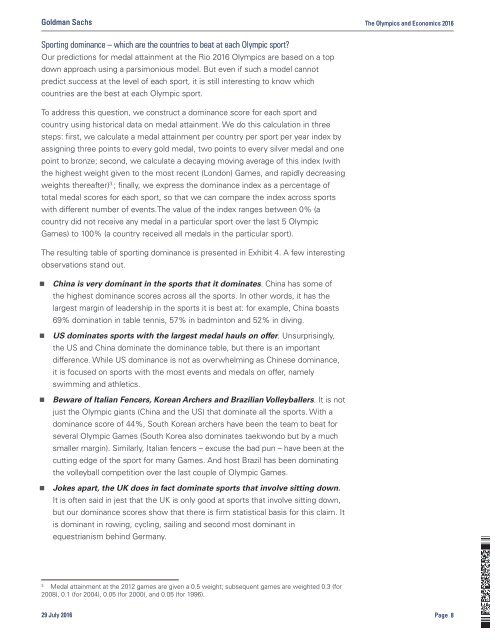You also want an ePaper? Increase the reach of your titles
YUMPU automatically turns print PDFs into web optimized ePapers that Google loves.
Goldman Sachs The Olympics and Economics 2016<br />
Sporting dominance – which are the countries to beat at each Olympic sport?<br />
Our predictions for medal attainment at the Rio 2016 Olympics are based on a top<br />
down approach using a parsimonious model. But even if such a model cannot<br />
predict success at the level of each sport, it is still interesting to know which<br />
countries are the best at each Olympic sport.<br />
To address this question, we construct a dominance score for each sport and<br />
country using historical data on medal attainment. We do this calculation in three<br />
steps: first, we calculate a medal attainment per country per sport per year index by<br />
assigning three points to every gold medal, two points to every silver medal and one<br />
point to bronze; second, we calculate a decaying moving average of this index (with<br />
the highest weight given to the most recent (London) Games, and rapidly decreasing<br />
weights thereafter) 3. ; finally, we express the dominance index as a percentage of<br />
total medal scores for each sport, so that we can compare the index across sports<br />
with different number of events.The value of the index ranges between 0% (a<br />
country did not receive any medal in a particular sport over the last 5 Olympic<br />
Games) to 100% (a country received all medals in the particular sport).<br />
The resulting table of sporting dominance is presented in Exhibit 4. A few interesting<br />
observations stand out.<br />
n<br />
n<br />
n<br />
n<br />
China is very dominant in the sports that it dominates. China has some of<br />
the highest dominance scores across all the sports. In other words, it has the<br />
largest margin of leadership in the sports it is best at: for example, China boasts<br />
69% domination in table tennis, 57% in badminton and 52% in diving.<br />
US dominates sports with the largest medal hauls on offer. Unsurprisingly,<br />
the US and China dominate the dominance table, but there is an important<br />
difference. While US dominance is not as overwhelming as Chinese dominance,<br />
it is focused on sports with the most events and medals on offer, namely<br />
swimming and athletics.<br />
Beware of Italian Fencers, Korean Archers and Brazilian Volleyballers. It is not<br />
just the Olympic giants (China and the US) that dominate all the sports. With a<br />
dominance score of 44%, South Korean archers have been the team to beat for<br />
several Olympic Games (South Korea also dominates taekwondo but by a much<br />
smaller margin). Similarly, Italian fencers – excuse the bad pun – have been at the<br />
cutting edge of the sport for many Games. And host Brazil has been dominating<br />
the volleyball competition over the last couple of Olympic Games.<br />
Jokes apart, the UK does in fact dominate sports that involve sitting down.<br />
It is often said in jest that the UK is only good at sports that involve sitting down,<br />
but our dominance scores show that there is firm statistical basis for this claim. It<br />
is dominant in rowing, cycling, sailing and second most dominant in<br />
equestrianism behind Germany.<br />
3.<br />
Medal attainment at the 2012 <strong>games</strong> are given a 0.5 weight; subsequent <strong>games</strong> are weighted 0.3 (for<br />
2008), 0.1 (for 2004), 0.05 (for 2000), and 0.05 (for 1996).<br />
29 July 2016 Page 8


